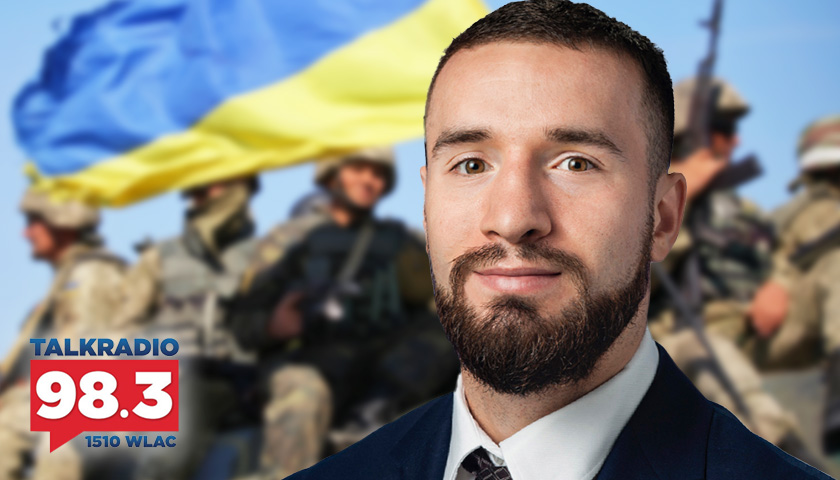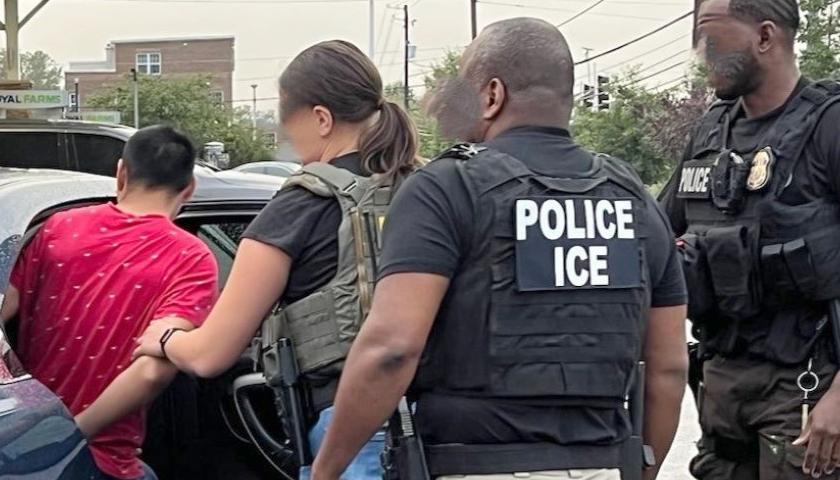Live from Music Row Friday morning on The Tennessee Star Report with Michael Patrick Leahy – broadcast on Nashville’s Talk Radio 98.3 and 1510 WLAC weekdays from 5:00 a.m. to 8:00 a.m. – host Leahy welcomed international relations expert and contributor for The Epoch Times, Dominick Sansone, in studio to describe the current military situation in Ukraine.
Leahy: I am with Dominick Sansone who specializes in Eastern Europe and Russia and Ukraine, a columnist with The Epoch Times. You live here in Nashville. You’re going to be going to a Ph.D. program somewhere. Tell us about that. Where is that program?
Sansone: That’s right. That program is in the great Hillsdale College.
Leahy: Hillsdale College. That’s fantastic. So all our listeners know this is a bright mind on the right path. Absolutely.
Sansone: Thank you.
Leahy: And knows a lot about Ukraine. So help us a little bit here in terms of your reporting on what’s going on in Ukraine. What I like to take a look at for you is this; what is the military situation now?
How many casualties are there? Where did the Russians try to succeed? Where did they fail? And in the ebb and flow of this war? Who has the upper hand right now, just in terms of raw military power?
Sansone: I think Russia has the upper hand, but that certainly doesn’t mean that Kyiv in Ukraine has not seriously obstructed their goals and objectives.
So basically, that initial push towards Kyiv, when kind of the war first broke out and there were these attacks all over the place, a lot of them failed. There were a lot of logistical problems with the Russians.
Leahy: I want to talk about this in a minute. So on the one hand, they have the upper hand in overall military force.
Sansone: That’s right.
Leahy: And yet their attempts to capture Kyiv sort of in the north-central middle part of the country have failed. Why did those attacks fail?
Sansone: I think one was because of logistical problems. There were also reports, although they said that these were highly trained Russian troops, there are pretty obvious reports that a lot of them were actually conscripted.
Leahy: In other words, not properly trained.
Sansone: No. In the Southeast, I think it is a little different now kind of in these areas that Russia deems more strategically important than, say, keep.
I do think like the initial push where there’s this whole de-Nazification, I think that was for domestic consumption in Russia, I don’t think those are actually objectives that’s just kind of to justify the entire campaign.
But in the Southeast, I mean, there are better train units. There are these Catarovites, which are from the Chechnya region.
Leahy: Those are tough fighters.
Sansone: They’re brutal fighters. There’s a famous brigade called the Somali Brigade that’s in the Southeast, and they’re also good fighters.
Leahy: What is the Somali Brigade? Are they Russians?
Sansone: They’re Russians. I don’t know if it’s actually related to the country of Somalia. I’m not exactly sure what the etymology of the name is, but they’re brutal fighters. They’re very renowned, and they’re part of the major push right now in the Southeast.
So that’s kind of I think why so many of the attacks initially failed is because Ukraine was fighting on its home turf. It was fighting for its cities.
It’s a war of national survival. That’s how they treated it and they really were good at what they were doing. They were using the Striker missiles that we had.
Leahy: The handheld missiles.
Sansone: That’s right. To shoot down aircraft. But in the Southeast now when we’re preparing here for a more conventional confrontation, this is dangerous.
This provides the Russians kind of the ability to engage with Ukraine on their own terms, which they’re more comfortable with.
Leahy: And they have more military troops.
Sansone: Yes.
Leahy: They have more military equipment.
Sansone: Yes, that’s right.
Leahy: And so they could just steamroll them. That’s what it looks like to me.
Sansone: Yes, exactly. And they got about $1 billion from the Biden administration recently, and that’s going to maybe last them a couple of days. As far as what it’s going to provide, in artillery shells. It’s really not a significant amount.
Leahy: $1 billion is not a significant amount in this war.
Sansone: Relatively. No.
Leahy: Where is Russia getting all the money to do this?
Sansone: Probably oil sales. It’s energy sales to Eastern Europe. And actually next week there’s going to be a vote. There’s an EU vote on an oil embargo for Russian oil flowing into Europe. Some think it’s going to fail. It depends.
Leahy: Why are they funding the Russian war machine?
Sansone: Because they’re not energy independent. Because they have gone all in on a lot of these green agenda policies. Germany has shut down all its nuclear reactors or previously had shut down all of its nuclear reactors.
They didn’t really prioritize imports of US liquefied natural gas anymore. They opted for that Nordstream Two pipeline with Russia.
Leahy: Which, by the way, was signed off on by Joe Biden.
Sansone: This was not signed off on during the Trump years.
Leahy: So basically the Biden administration allowed Europe to become energy dependent on Russia.
Sansone: Totally.
Leahy: And now they need that natural oil. Natural gas. They need it.
Sansone: Or they will face some very serious economic programs.
Leahy: Let’s talk about the practicality of this. Given the fact that they’ve made all these bad decisions enhanced by the Biden administration, what would be the practical consequences to Europe if they said, we’re not taking any of your oil, Russia, we’re not taking any of your natural gas today, we’re shutting it off.
The money wouldn’t be flowing to Russia. But what would happen to Europe, tomorrow if they shut off the oil and natural gas?
Sansone: I think there would be almost an immediate economic recession. I don’t think it’s plausible right now for Europe. And that’s part of the reason why Russia chose now to start this campaign, to start this initiative to try to take part of Ukraine.
Because again, he knew that Europe largely had his hands tied. And already the resolve is fracturing of the European Alliance in regards to the energy issue. We have French elections next week in which Emmanuel Macron faces the more populist candidate, Marine LePen.
And she’s denounced the Russian invasion, but she’s certainly more friendly in terms of energy when it comes to Russia. Germany again, just out of necessity, really can’t divest themselves of Russian oil and natural gas right now.
Leahy: If they just said no oil and natural gas from Russia right now. How quickly could America replace that supply?
Sansone: I really don’t know. I don’t know if we could do it just because of where our capacity is at with sort of the hampering of the oil and natural gas industry in this country. We are still exporting natural gas and oil.
Leahy: All because of the Biden maladministration policies. It’s almost as if they planned it this way!
Sansone: It’s hard to believe really. It’s just kind of a lack of common sense.
Leahy: Just to put it in context, if we went back like five years ago, what percentage of energy in Europe came from Russia, and what’s the percentage today, what change has that been?
Sansone: In Germany, it’s 40 percent or it was 40 percent before the invasion. Before that, it was always high, but it was lower than that because again we were looking at other options such as us liquefied natural gas.
Listen to the interview:
– – –
Tune in weekdays from 5:00 – 8:00 a.m. to The Tennessee Star Report with Michael Patrick Leahy on Talk Radio 98.3 FM WLAC 1510. Listen online at iHeart Radio.
Background Photo “Ukraine Military” by Ministry of Defense of Ukraine. CC BY-SA 2.0.





